How to replace or | fix a heater thermostat?
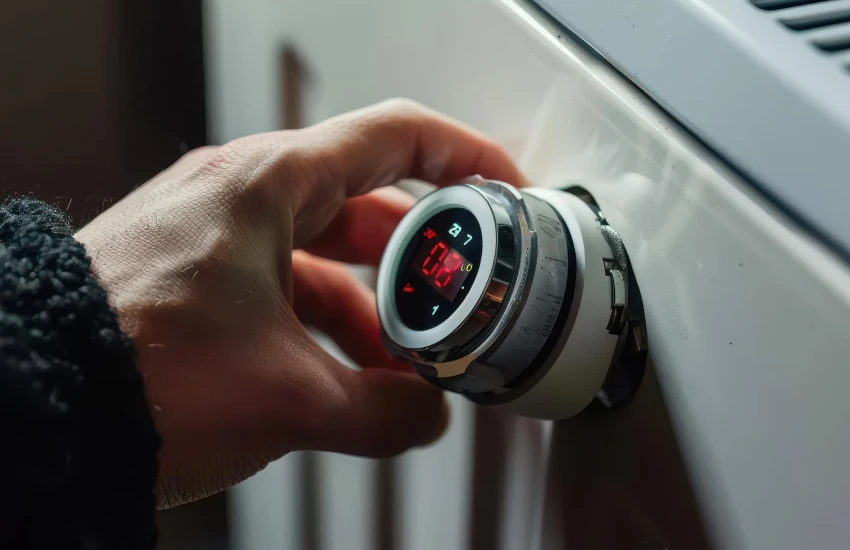
This comprehensive guide walks you through the essentials of thermostat troubleshooting, maintenance, and replacement. From understanding basic warning signs to exploring smart thermostat features, learn how to diagnose problems, perform DIY fixes, and know when to call professionals. Whether you’re dealing with temperature inconsistencies or considering an upgrade to a smart system, this guide provides the insights you need to maintain optimal home comfort through proper thermostat management.
How to replace or fix a heater thermostat?
Picture this: it’s the coldest night of the year, and you’re huddled under blankets, wondering why your usually cozy home feels more like an ice cave. You check your thermostat, but it seems to be playing a frustrating game of hot and cold with your comfort. Sound familiar? You’re not alone. Thermostat issues are like the common cold of home heating systems – everybody deals with them eventually, but knowing how to treat the symptoms (and when to call the doctor) makes all the difference.
Here, we’ll walk you through everything you need to know about diagnosing, fixing, and replacing your home’s temperature command center. Whether you’re dealing with a temperamental older model or considering an upgrade to a smart thermostat, we’ve got you covered. Think of this guide as your roadmap to optimal home comfort – no engineering degree is required!
Your fridge is a kitchen superstar as it keeps all your food fresh and drinks cold.
But does the fridge feel warm when you open it?
Is there water all over the floor?
Fridge issues are the worst!
Signs Your Thermostat Needs Attention
Temperature inconsistency is often the first red flag that your thermostat might be staging a rebellion. If you’re noticing that your living room feels like a sauna while your bedroom mimics the Arctic, your thermostat could be the culprit. This frustrating phenomenon usually stems from incorrect calibration, aging components, or sometimes something as simple as a dying battery.
Common warning signs include:
- Inconsistent temperature readings
- Unresponsive buttons or display
- Frequent system cycling
- Unexpected shutoffs
Most homeowners don’t realize that thermostat placement plays a crucial role in its performance. That innocent-looking device mounted on your wall is actually quite sensitive to its surroundings. A thermostat placed near drafty windows, in direct sunlight, or too close to air vents can give false readings that make your heating system behave badly.
The Art of DIY Thermostat Repairs
Before you rush to replace your thermostat, let’s explore some DIY solutions that might save you time and money. Start with the basics: remove the cover carefully and inspect the interior. You’d be surprised how often a thorough cleaning can resurrect a “broken” thermostat. Dust and debris can accumulate over time, acting like a thermal insulator and throwing off temperature readings.
Essential maintenance steps include:
- Cleaning internal components with compressed air
- Checking and tightening wire connections
- Replacing batteries
- Verifying proper leveling
When it comes to wiring, think of your thermostat as a tiny mission control center. Each wire serves a specific purpose, coordinating the intricate dance between your heating system’s components. If you notice any discolored or loose wires, you’ve likely found your culprit. However, remember that electrical work isn’t for everyone – there’s no shame in calling a professional if you’re not confident in your wire-whispering abilities.
The Replacement Decision
Sometimes, like that ancient flip phone in your drawer, your thermostat has simply served its time. Modern thermostats offer features that would seem like science fiction to their predecessors. Imagine adjusting your home’s temperature from your smartphone while you’re still at work, or having a device that learns your schedule and adjusts itself automatically.
The decision to upgrade often comes down to more than just fixing a problem. Today’s smart thermostats can significantly reduce your energy bills through advanced programming and learning capabilities. Think of it as investing in a tiny, wall-mounted energy consultant that works 24/7 to optimize your home’s comfort and efficiency.
Signs it’s time for replacement:
- Age exceeds 10 years
- Frequent malfunctions despite repairs
- Rising energy bills
- The desire for smart features
Making the Switch: Installation Basics
If you’ve decided to replace your thermostat, proper preparation is key. Begin by turning off power at the circuit breaker – this isn’t just a safety precaution, it’s a necessity. Next, document your existing wiring setup. In the age of smartphones, there’s no excuse for not taking a quick photo before disconnecting anything. This simple step can save you hours of frustration later.
The physical installation process requires patience and attention to detail. Modern thermostats come with detailed instructions, but here’s where many DIYers go wrong: they rush through the process. Take your time connecting each wire, ensure your mounting plate is level, and double-check every connection before restoring power.
Smart Features Worth Considering
The world of smart thermostats has revolutionized home climate control. Instead of simple temperature adjustments, these devices offer an ecosystem of comfort and efficiency features. They can learn your schedule, automatically adjust based on your location, and even integrate with other smart home devices for synchronized comfort control.
Key smart features to consider:
- Remote control via smartphone apps
- Learning capabilities for automatic adjustments
- Energy usage reporting and analysis
- Smart home integration options
- Occupancy sensing and geofencing
Professional Installation: When to Make the Call
While many thermostat installations can be DIY projects, certain situations call for professional expertise. High-voltage systems, complex wiring configurations, or installations requiring new wiring should be handled by qualified technicians. Think of it this way: the cost of professional installation is a small price to pay compared to the potential consequences of an incorrect DIY job.
Consider professional installation when:
- Dealing with high-voltage systems
- Adding new wiring
- Upgrading to complex smart systems
- Working with multi-zone heating setups
Maintenance for Longevity
Once your thermostat is properly installed, regular maintenance will ensure it serves you well for years to come. Seasonal checks of your thermostat’s accuracy, along with periodic cleaning and battery replacement, can prevent the most common issues.
The placement of your thermostat continues to be crucial even after installation. Keep an eye out for any changes in your home that might affect its performance. New furniture, renovations, or even seasonal changes in sunlight patterns can impact your thermostat’s accuracy.

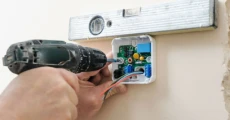
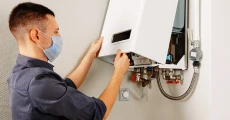
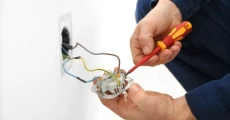
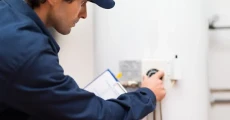
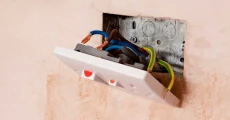
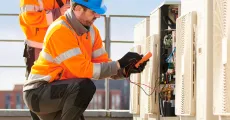
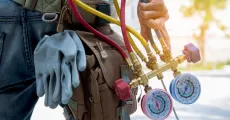
Takeaway
Whether you’re troubleshooting an existing thermostat or installing a new one, understanding these basics can save you time, money, and comfort. Remember, while many thermostat issues can be resolved through DIY efforts, there’s no shame in seeking professional help when needed. After all, your home’s comfort system is too important to leave to chance.
Trust CLT Appliance Repair for all your thermostat installation and repair needs. Our certified technicians specialize in both traditional and smart thermostat systems, ensuring proper installation and calibration for optimal performance. With our upfront pricing and same-day service of heating repair in charlotte nc availability, you can count on us to keep your home’s temperature control system working flawlessly throughout the year.
FAQs
Most thermostats need fresh batteries annually, but check your model’s specific requirements. Some smart thermostats will send notifications when batteries are running low.
Not all thermostats are compatible with all heating systems. Check your system’s voltage and wiring configuration before purchasing a new thermostat.
With proper maintenance, a modern thermostat can last 10-15 years. However, technological advances might make upgrading worthwhile even before your current unit fails.
For most homeowners, yes. The energy savings typically offset the initial cost within two years, and the additional features can significantly improve your home’s comfort.
Incorrect readings often stem from poor placement, calibration issues, or dying batteries. Start with these simple fixes before considering replacement.
Don't let a malfunctioning Heater disrupt your daily life. Contact CLT Appliance Repair today at 704-606-9043 to schedule your Heater repair service.
We'll have your Heater back to optimal performance in no time!
Dryer Repair Charlotte NC | Washing Machine Repair Charlotte NC | Refrigerator Repair Charlotte NC | Microwave Oven Repair Charlotte NC | Freezer Repair Charlotte NC | Dryer Vent Cleaning Charlotte NC | Dishwasher Repair Charlotte NC | Cooktop Repair Charlotte NC | Stove Repair Charlotte NC | Charlotte Ice Maker Repair | Garbage Disposal Repair Charlotte NC | Plumbing Repair Charlotte NC | Water Heater Repair Charlotte NC
Admiral Appliance Repair | Amana Appliance Repair | Bosch Appliance Repair | Electrolux Appliance Repair | Frigidaire Appliance Repair | General Electric Appliance Repair | Haier Appliance Repair | Hotpoint Appliance Repair | Jenn-Air Appliance Repair | Kenmore Appliance Repair | KitchenAid Appliance Repair | LG Appliance Repair | Magic Chef Appliance Repair | Maytag Appliance Repair | Roper Appliance Repair | Samsung Appliance Repair | Speed Queen Appliance Repair | Whirlpool Appliance Repair | Dacor Appliance Repair | Viking Appliance Repair | Thermador Appliance Repair | Sub-Zero Appliance Repair | Wolf Appliance Repair | Monogram Appliance Repair | Bertazonni Appliance Repair | BlueStar Appliance Repair | Thor Appliance Repair | Miele Appliance Repair | Cafe Appliance Repair | GE Appliance Repair
Freezer Repair Indian Land SC | Freezer Repair Indian Trail NC | Freezer Repair Pineville NC | Freezer Repair Rock Hill SC | Freezer Repair Belmont NC | Freezer Repair Matthews NC | Freezer Repair Lancaster SC | Freezer Repair Cornelius NC | Freezer Repair Fort Mill SC | Freezer Repair Concord NC | Freezer Repair Denver NC | Freezer Repair Monroe NC | Freezer Repair Mooresville NC | Freezer Repair Harrisburg NC | Freezer Repair Lake Wylie SC | Freezer Repair Huntersville NC | Freezer Repair Kannapolis NC | Freezer Repair Mint Hill NC | Freezer Repair Waxhaw NC | Freezer Repair Troutman NC | Freezer Repair Davidson NC | Freezer Repair Gastonia NC | Freezer Repair Charlotte NC

